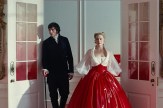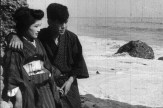Here’s why we love ‘The Bear’ even though it’s stressful to watch
“It really speaks to the complexity of the human experience,” Northeastern professor Kristen Lee said of the show, which has a new season starting June 26.

In the opening episode of “The Bear,” Carmen “Carmy” Berzatto returns home to take over his late brother’s restaurant. Immediately, he clashes with his cousin/restaurant manager Richie over the menu and with the staff over his expectations for the kitchen. This yelling and arguing culminates with Richie pulling out a gun in front of a group of customers and firing it into the air.
The yelling and then the gun put some viewers on edge. Somehow, the show only gets more stressful from there. Rolling Stone magazine called “The Bear” “the most stressful thing on TV.” But the review included this important caveat: “It’s also great.”
The show won big at the Emmys, Golden Globes and SAG Awards in the last year and its third season starts June 26, so it’s clearly struck a chord with audiences. It also begs the question: Why do we like to watch stressful shows?
The high tensions of “The Bear” can mimic the effect people get while watching horror movies, according to Kristen Lee, a teaching professor of behavioral science at Northeastern University. Both can create an adrenaline rush and provide a bit of an escape from the viewer’s everyday life.
“(Stressful media) can create a distancing from (viewers’) own lives that can be evocative and might provide some kind of respite from their day to day where they feel understimulated or overstimulated,” Lee adds.

But a show like “The Bear” is a little less distant than most horror movie premises. Many people have worked in restaurants like the one on the show or experienced family strife similar to the experience of the Berzattos. But for some, this might add to the appeal.
Not only does “The Bear” accurately portray the intensity of working in a kitchen, from the constant churning of meal tickets to the sizzling of food on the stove, but it also captures universal emotions.
The restaurant Carmy inherited is constantly on the brink of going broke or being targeted by health inspectors. This constant fear of financial ruin is one many Americans can relate to, Lee says, with 65% of the country living paycheck to paycheck.
“The reason (the show) is intriguing is that it really speaks to the complexity of the human experience and the duality of pain and joy,” Lee says. “They’ve done a really nice job in terms of the rawness of it. It’s quite true to life and doesn’t feel contrived. That might potentially bring comfort to a viewer. It could make them feel that they’re not alone and … the intensity of it might actually bring comfort that their life isn’t as difficult as the show.”
Similarly, the pressure of working in a kitchen might translate for anyone working in a high-pressure career, even if it’s not in the restaurant industry.
“Even if someone hasn’t worked in that space, I think that those who are striving for their own enterprise, who are trying to kind of come of age and have a lot of pressure and make it, it’s very relatable for that sense of no give,” Lee says.
Featured Posts
Carmy is not only dealing with keeping a sinking restaurant afloat, but with the loss of his brother to suicide. In the sixth episode of the second season, “Fishes,” viewers see a flashback to a Christmas dinner before Carmy’s brother died. Many found the hour-long episode to be one of the more intense of the series as the evening unraveled under the pressure of creating a perfect meal in the face of tense family dynamics.
These familial conflicts and mental health struggles affect many families, Lee says.
“The Bear” also diffuses its stressful moments with levity. While there was some outcry when the show won Emmys under the comedy category (one it qualified for due to the shorter length of its episodes), others argued “The Bear” does find humor in its timing and its absurdity.
“We’ve seen, in general, a shift in comedy that has much more of an integrated approach between pain and sorrow and joy and lightheartedness,” Lee says. “Those fusions of levity and tragedy are really interesting.”
Lee, who has looked into humor as a coping mechanism, says people use jokes as a way to distance themselves from the discomfort of their feelings and also diffuse the situation. And as anyone who’s been in a stressful environment knows, this can help in any stressful scenario, be it in the workplace or at a family party.
“This is a very helpful mechanism,” Lee adds. “Humor is cited as a protective factor towards our well-being, mental health and resilience. Even though life can be very serious, oftentimes the playfulness of humor, even dark humor can bring a lot of levity and can help mitigate the consequences of very stressful situations.”











